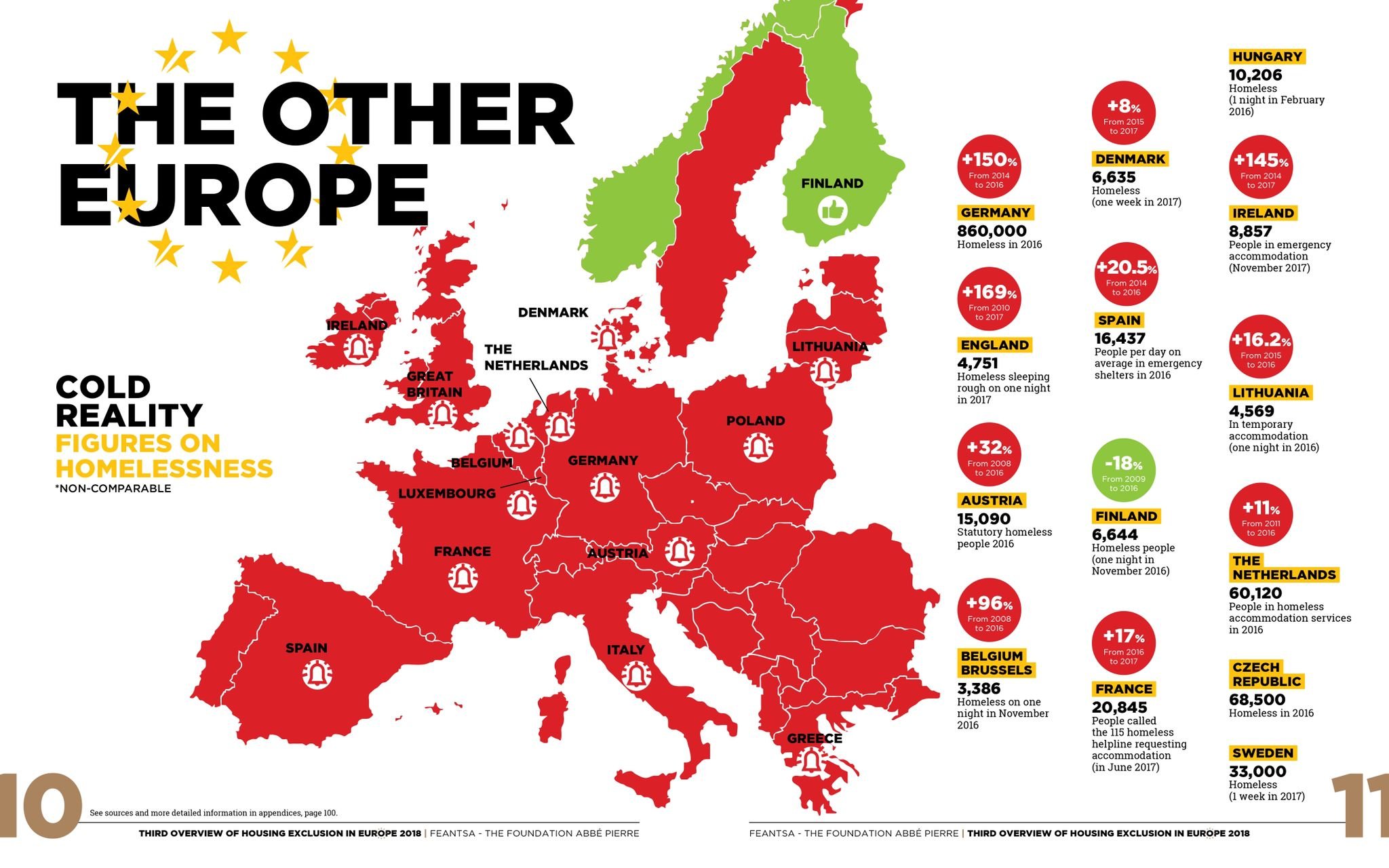Written by Jillian Salaway
According to the Spanish National Statistical Institute, there has been a nearly 5% increase in the number of homeless people in the country of Spain from 2005 to 2012. This increase has only sharpened with the disastrous consequences of the pandemic, impacting the lives of all people for the last two years. Despite providing more public assistance than most other countries and offering a seemingly strong safety net for the financially unstable, the question that begs to be asked is, why is the number of homeless people in Spain still growing?
To better understand this question, I spoke to a social policy consultant and economist based in Barcelona, Pablo Tucat. In our conversation, Tucat provided insight to the potential causation of the homelessness increase in Spain. In our conversation, he began by citing that the first National Strategy for Homeless People was approved and implemented by the Spanish government in 2015. This program allocates state funds to various social services that address homelessness, but has experienced a series of faults in its execution. The obvious fault is the growing numbers of homeless persons despite the development of this program, but Tucat gives light to the underlying source of this issue:
“The degree of implementation of this strategy barely reaches 38%. In part, this is explained by the lack of a specific budget allocation. . . In 2020, the Institute for the Evaluation of Public Policies, dependent on the Ministry of Finance and Public Administration, published a fairly critical report on the National Strategy. One of the most notable points from my point of view is the lack of monitoring and evaluation mechanisms. This is essential to implement corrective measures and implement better policies.”
In essense, Tucat emphasizes the downfalls of an ill-equipped system that failed to work out the technicalities necessary for effective implementation. However, these shortcomings can be alleviated, as noted by Tucat in our conversation. If the state is able to allocate resources to the correct services, such as in the residential sector, then it is likely that the number of homeless persons will begin to decline.
For an empirical understanding of the growing number of homelessness in Spain, I spoke to one of our own Homeless Entrepreneurs Larry Adesuyi of his own experiences with housing insecurity. Larry is originally from Nigeria and began his college education there, but received his degree in Business Administration and Marketing in Barcelona. Larry decided to move here for a better life than what he had in his home country, but has faced some hardships since moving to Spain five years prior. Larry just received a job working in a call center for a research company since joining our HELP line program, but aspires to be his own boss one day. He hopes to open up a shop in Barcelona selling African fabric in the near future, but his big dream is to open up his own culturally immersive Nigerian restaurant to pursue his love for cooking and to create a more culturally diverse environment in the city. During our interview, I asked him a series of questions about his experience with the assistance provided to those facing housing insecurity from the state, as well as the opportunities offered to him since joining Homeless Entrepreneur’s HELP line program.
Jillian: “From 2005-2012, there has been a nearly 5% increase in the number of homeless people present in Spain, with the number continuing to grow since the pandemic began. Why do you think there has been an increase?”
Larry: “I wouldn’t be able to say exactly why, but from my experiences living here, especially among non-Europeans, there is an accommodation issue. A lot of people try to access social services and there’s always a long wait list. . . You have to wait for almost forever. And at the end of the day, if you are in a desperate situation you need to do something. . . find other homes or shelters or accommodations to stay. From the little experience I have, most of the people with accommodation are foreigners. The system here makes it difficult for them to access social services, and makes them go out into the world while they are waiting. I think the system takes too much time processing social services and accommodations, and it drives me crazy.”
Jillian: “Do you think the current welfare, employment and housing policies offered to homeless people by the Spanish government are helpful in preventing and addressing homelessness? Why or why not?”
Larry: “I don’t think it is helpful because the numbers would be decreasing instead of increasing. I do not think they care enough. They are too focused on things to make them more money. Even if they do not care that much, at least a Spanish person, worst case scenario, should never be on the street in their own country.”
Jillian: “Are there specific policies offered by the Spanish government that have helped you personally? For example: welfare benefits, temporary housing, etc.”
Larry: “No, none. I tried when I really needed it, when I had my first accommodation problem. I just kept getting told the same thing and kept waiting until I just gave up, you know.”
Jillian: “Do you think the Spanish government should expand their social policies offered to the homeless population? How should their policies be improved?”
Larry: “Of course I believe the system needs to be improved. First of all, I think the Spanish system needs foreigners, especially in building the system, in the workforce. But they do not make it easy for them to enter into that system. I cannot say specifically, but whatever they have to do to make inclusion easier for non-European, for Africans. They want to stay here and build the system, but the system gives a lot of discouragement, a lot of uncertainty.”
Jillian: “Do you think that the HELP program has done more for you than the state has in terms of providing opportunities and improving your quality of life? Why or why not?”
Larry: “Because I am still in the beginning stages of the program, I would say we are getting there. Right now, it is looking really positive. For instance, soon I am going to start a market analysis course via IBM SkillsBuild thanks to the partnership Homeless Entrepreneur has with IBM. I think this will take me to a higher level in my career, that is a step in the right direction for me to move in a different stage of life. There is also a language coach and a health coach, so for the next few months I really look forward to the future, it feels really exciting and positive. And I think it is going to be a life changing experience, you know. I am certainly ready and willing to do the process with Homeless Entrepreneur. And I want to do this not just for myself, but also for so many other people who are struggling with so many issues that I want to help and be there for.”
Jillian: “Where do you see yourself at the end of your HELP program?”
Larry: “I see myself starting at least one of my businesses by the end of the program, which I’m certain will be the one with the African fabrics. I hope to have changed jobs and to move to a better job, and this should be a result of the certification I hope to receive by the end of the program. The dream is to have financial independence and to start my own businesses.”
Jillian: “What would you say to others experiencing housing insecurity or homelessness?”
Larry: “People in this situation, they really really really need to talk to people. It can be frustrating and depressing, so it’s important to have someone to talk to or to look for someone to talk to. I would advise people to first talk to people as much as you can and reach out to Homeless Entrepreneur for opportunities and solutions.”
Jillian: “Do you have any final thoughts or comments?”
Larry: “Well, I definitely would like to thank Homeless Entrepreneur for the opportunity. . . I am grateful to be a part of the program and I want the organization and the team to know that I will do my best to get the best out of this opportunity.”
Larry provides a personal insight to the neglect and dismissiveness of the state towards its most vulnerable populations. Everyone deserves the same opportunities and rights to basic necessities such as housing and employment, and it is clear that this is not prioritized enough by the Spanish government. Larry displays an immense amount of integrity and motivation to become successful, not to mention a college degree, yet he still struggles to make ends meet. This is not the fault of the individual, but of the system. Organizations like Homeless Entrepreneur are a key model of how the government should treat those facing financial hardship by providing opportunities of empowerment, not of stagnance and unfulfillment.





